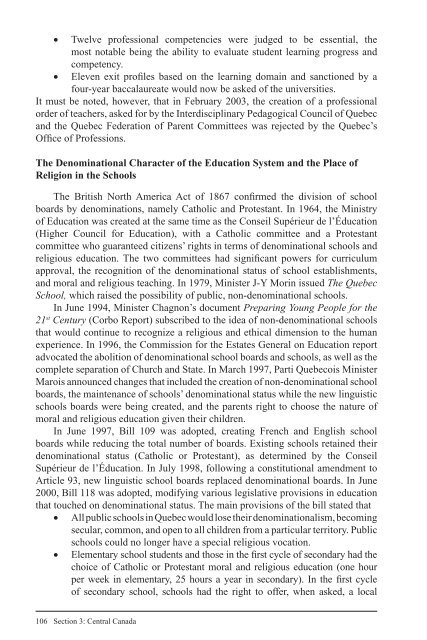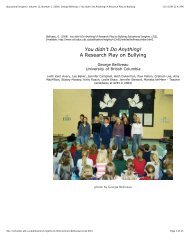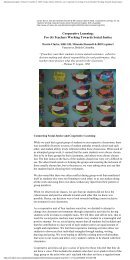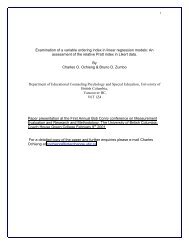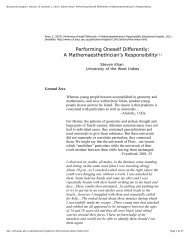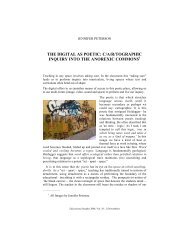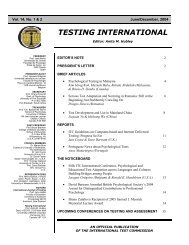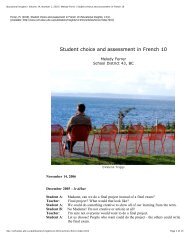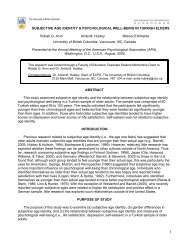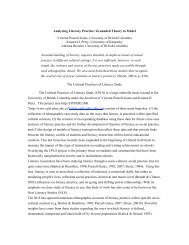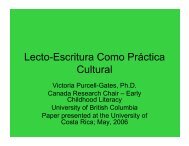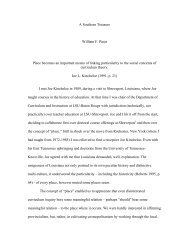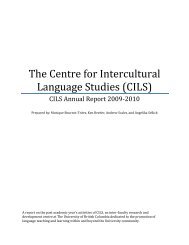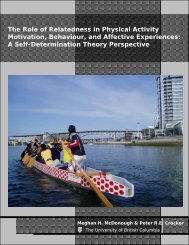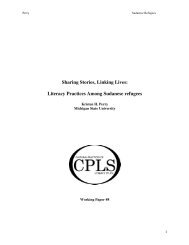The evolution of professionalism - Centre for Policy Studies in ...
The evolution of professionalism - Centre for Policy Studies in ...
The evolution of professionalism - Centre for Policy Studies in ...
You also want an ePaper? Increase the reach of your titles
YUMPU automatically turns print PDFs into web optimized ePapers that Google loves.
• Twelve pr<strong>of</strong>essional competencies were judged to be essential, the<br />
most notable be<strong>in</strong>g the ability to evaluate student learn<strong>in</strong>g progress and<br />
competency.<br />
• Eleven exit pr<strong>of</strong>i les based on the learn<strong>in</strong>g doma<strong>in</strong> and sanctioned by a<br />
four-year baccalaureate would now be asked <strong>of</strong> the universities.<br />
It must be noted, however, that <strong>in</strong> February 2003, the creation <strong>of</strong> a pr<strong>of</strong>essional<br />
order <strong>of</strong> teachers, asked <strong>for</strong> by the Interdiscipl<strong>in</strong>ary Pedagogical Council <strong>of</strong> Quebec<br />
and the Quebec Federation <strong>of</strong> Parent Committees was rejected by the Quebec’s<br />
Offi ce <strong>of</strong> Pr<strong>of</strong>essions.<br />
<strong>The</strong> Denom<strong>in</strong>ational Character <strong>of</strong> the Education System and the Place <strong>of</strong><br />
Religion <strong>in</strong> the Schools<br />
<strong>The</strong> British North America Act <strong>of</strong> 1867 confi rmed the division <strong>of</strong> school<br />
boards by denom<strong>in</strong>ations, namely Catholic and Protestant. In 1964, the M<strong>in</strong>istry<br />
<strong>of</strong> Education was created at the same time as the Conseil Supérieur de l’Éducation<br />
(Higher Council <strong>for</strong> Education), with a Catholic committee and a Protestant<br />
committee who guaranteed citizens’ rights <strong>in</strong> terms <strong>of</strong> denom<strong>in</strong>ational schools and<br />
religious education. <strong>The</strong> two committees had signifi cant powers <strong>for</strong> curriculum<br />
approval, the recognition <strong>of</strong> the denom<strong>in</strong>ational status <strong>of</strong> school establishments,<br />
and moral and religious teach<strong>in</strong>g. In 1979, M<strong>in</strong>ister J-Y Mor<strong>in</strong> issued <strong>The</strong> Quebec<br />
School, which raised the possibility <strong>of</strong> public, non-denom<strong>in</strong>ational schools.<br />
In June 1994, M<strong>in</strong>ister Chagnon’s document Prepar<strong>in</strong>g Young People <strong>for</strong> the<br />
21 st Century (Corbo Report) subscribed to the idea <strong>of</strong> non-denom<strong>in</strong>ational schools<br />
that would cont<strong>in</strong>ue to recognize a religious and ethical dimension to the human<br />
experience. In 1996, the Commission <strong>for</strong> the Estates General on Education report<br />
advocated the abolition <strong>of</strong> denom<strong>in</strong>ational school boards and schools, as well as the<br />
complete separation <strong>of</strong> Church and State. In March 1997, Parti Quebecois M<strong>in</strong>ister<br />
Marois announced changes that <strong>in</strong>cluded the creation <strong>of</strong> non-denom<strong>in</strong>ational school<br />
boards, the ma<strong>in</strong>tenance <strong>of</strong> schools’ denom<strong>in</strong>ational status while the new l<strong>in</strong>guistic<br />
schools boards were be<strong>in</strong>g created, and the parents right to choose the nature <strong>of</strong><br />
moral and religious education given their children.<br />
In June 1997, Bill 109 was adopted, creat<strong>in</strong>g French and English school<br />
boards while reduc<strong>in</strong>g the total number <strong>of</strong> boards. Exist<strong>in</strong>g schools reta<strong>in</strong>ed their<br />
denom<strong>in</strong>ational status (Catholic or Protestant), as determ<strong>in</strong>ed by the Conseil<br />
Supérieur de l’Éducation. In July 1998, follow<strong>in</strong>g a constitutional amendment to<br />
Article 93, new l<strong>in</strong>guistic school boards replaced denom<strong>in</strong>ational boards. In June<br />
2000, Bill 118 was adopted, modify<strong>in</strong>g various legislative provisions <strong>in</strong> education<br />
that touched on denom<strong>in</strong>ational status. <strong>The</strong> ma<strong>in</strong> provisions <strong>of</strong> the bill stated that<br />
• All public schools <strong>in</strong> Quebec would lose their denom<strong>in</strong>ationalism, becom<strong>in</strong>g<br />
secular, common, and open to all children from a particular territory. Public<br />
schools could no longer have a special religious vocation.<br />
• Elementary school students and those <strong>in</strong> the fi rst cycle <strong>of</strong> secondary had the<br />
choice <strong>of</strong> Catholic or Protestant moral and religious education (one hour<br />
per week <strong>in</strong> elementary, 25 hours a year <strong>in</strong> secondary). In the fi rst cycle<br />
<strong>of</strong> secondary school, schools had the right to <strong>of</strong>fer, when asked, a local<br />
106 Section 3: Central Canada


